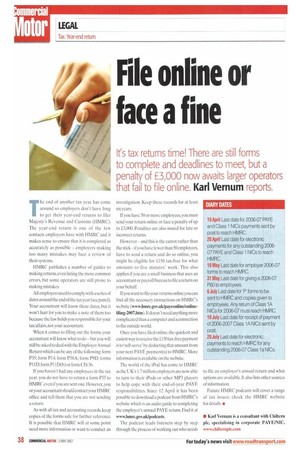File online or face a fine
Page 38

If you've noticed an error in this article please click here to report it so we can fix it.
It's tax returns time! There are still forms
to complete and deadlines to meet, but a penalty of £3,000 now awaits larger operators that fail to file online. Karl Vernum reports.
The end of another tax year has come around so employers don't have long to get their year-end returns to Her Majesty's Revenue and Customs (HMRC). The year-end return is one of the few contacts employers have with HMRC and it makes sense to ensure that it is completed as accurately as possible — employers making too many mistakes may face a review of their systems.
HMRC publishes a number of guides to making returns, even listing the more common errors, but some operators are still prone to making mistakes.
All employers need to comply with a series of dates around the end of the tax year (see panel). Your accountant will know these dates, but it won't hurt for you to make a note of them too because the law holds you responsible for your tax affairs, not your accountant.
When it comes to filling out the forms, your accountant will know what to do — but you will still he asked to deal with the Employer Annual Return which can be any of the following: form P35; form P14; form P38A; form P9D; forms Pl1D; form Pl1D(b) or forrn CIS 36.
If you haven't had any employees in the tax year, you do not have to return a form P35 to HMRC even if you are sent one. However, you or your accountant should contact your HMRC office and tell them that you are not sending a return.
As with all tax and accounting records, keep copies of the forms safe for further reference. It is possible that HMRC will at some point need more information or want to conduct an investigation. Keep these records for at least six years.
If you have 50 or more employees, you must send your return online or face a penalty of up to £3,000. Penalties are also issued for late or incorrect returns.
However and this is the carrot rather than the stick if you have fewer than 50 employees, have to send a return and do so online, you might be eligible for £150 tax-free for what amounts to five minutes' work. This also applies if you are a small business that uses an accountant or payroll bureau to file a return on your behalf.
If you want to file your returns online you can find all the necessary instructions on HM RC's website (Www.hmrc.gov.ukipayeonlinelonlinefiling-2007.htm).1t doesn't need anything more complicated than a computer and a connection to the outside world.
Once you have filed online, the quickest and easiest way to receive the £150 tax-free payment is to 'self-serve' by deducting that amount from your next PAYE payment(s) to HMRC. More information is available on the website.
The world of the iPod has come to HMRC as the UK's 1.7 million employers are now able to turn to their iPods or other MP3 players to help cope with their end-of-year PAYE responsibilities. Since 12 April it has been possible to download a podcast from HMRC's website which is an audio guide to completing the employer's annual PAYE return. Find it at www.hmrc.gov.uldpodcasts.
The podcast leads listeners step by step through the process of working out who needs to file an employer's annual return and what options are available. It also lists other sources of information.
Future HMRC podcasts will cover a range of tax issues; check the HMRC website for details.
• Karl Vernum is a consultant with Chiltern plc, specialising in corporate PAVE/NIC. wwvv.chilternplc.com


























































































































































































